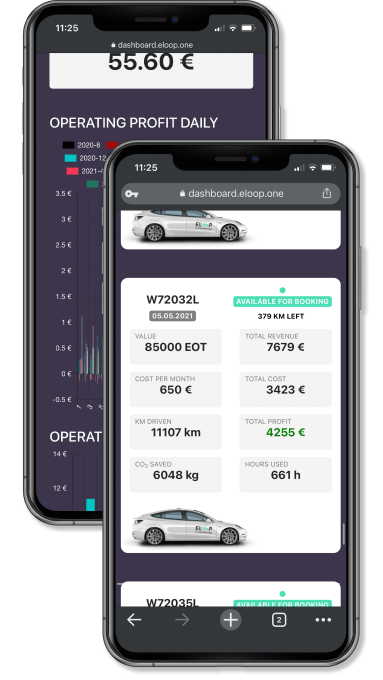As the global crypto market capitalization sits around $1.2 trillion, some industry players are looking to build upon enterprise businesses to grow the pool and potentially bring in greater adoption. The key companies, tactics and business models to bring that in is yet to be determined, but that isn’t stopping some web3 startups from diving in together.
“I think a lot of disruptive real-world adoption is not going to come from enterprises, but startups that create new ideas,” Leonard Dorlöchter, co-founder of Peaq network, told TechCrunch+. “We expect a lot of adoption earlier in web3, but in the next five years, tokenization of assets of any kind will happen.”
ELOOP is a token-based car-sharing blockchain project that allows community members to share the revenue of its electric car fleet in Vienna. The cars are Teslas powered on the Polkadot blockchain via Peaq network, which builds applications for vehicles, robots and devices.
Dorlöchter thinks that machines like Teslas should be able to “provide goods and services autonomously.” His company built blockchain infrastructure to help create applications like ELOOP’s, to form decentralized car sharing and onboard Teslas onto its network.
ELOOP has over 90,000 registered users using its fleet of 200 Teslas, with about 100 with Peaq-linked IDs (managed by 487 token holders). The token holders have made a combined $138,000 in revenue from almost 6,700 trips, according to ELOOP’s dashboard.

Image Credits: ELOOP (opens in a new window)
In the age of automation, web3 is important because it opens up the value of ownership beyond just the “hands of the 1%,” Dorlöchter said. “Solutions like these will enable the ability to invest in autonomous taxis and earn from them.” But because it integrates between users and companies transparently, it might be suitable for a select group of users.
A business model like this could be good for startups or established companies looking to integrate a bigger community through sharing ownership of products or services — like the fleet of Teslas — while under a shared roof. But at the same time, this could cause some headaches for bigger corporations with greater restrictions, so a different token holder approach — one that doesn’t involve physical goods — could be applied. Think online applications, protocols or products.
Web3 potential beyond car sharing
For those interested in web3, the potential for token holders isn’t limited to car sharing, Dorlöchter said. There’s an opportunity for the market to grow for “all kinds of massive, big assets” and enterprises, too. Dorlöchter said Peaq is currently engaging with “many enterprises” like Bosch appliances that are looking to build revenue streams via web3. ELOOP is also looking into building shared-revenue businesses in other spaces like solar panels and wind turbines, CTO Frederic Nachbauer said.
Both Dorlöchter and Nachbauer think that institutions need to incorporate web3 into their businesses in order to grow, but there’s still hesitation. “There’s a bad reputation to the space and usability and trust issues,” Dorlöchter said. “So for enterprises, it needs regulation and it needs to be regulatorily secure and have product infrastructure that helps them invest and manage their assets in a secure user-friendly way. Custodians and companies that are trusted third parties, they need that.”
Separately, most companies don’t want to engage in something super complicated if they don’t have to. So adding web3 components can be daunting to small- to medium-sized businesses that might not have the resources to enter the space. But if companies like ELOOP and Peaq can help streamline processes, it’ll be easier to onboard enterprises that might want to tokenize assets or implement web3 technology into their business models.
In a growingly remote world, building a virtual community is more important than ever. “Communities want to invest and earn from [businesses] and as frameworks come into place, they’ll be able to unlock a lot of enterprises with it,” Dorlöchter said. So there is potential for this to succeed; it just has to be done in a way that doesn’t scare away people who aren’t familiar with the space.
In the near future, Dorlöchter thinks there will be greater web3 adoption in the next one to two years from traditional companies. And in the next five years, blockchain technology will run enterprise operations “without even knowing it,” he said. “We’ve been working with enterprises for the [past] five to six years and now is the time; steps are being taken and the value is being found [and] applied in a meaningful way.”
“In the end, we have to make tools as easy as possible, so they can use it, and [as] secure as possible, so they can trust it,” Nachbauer said.
